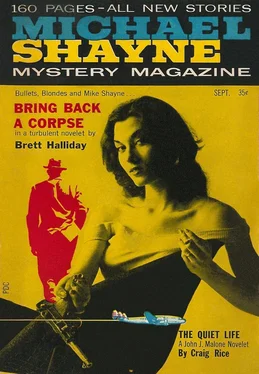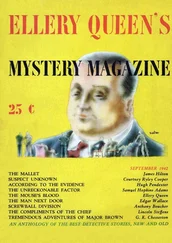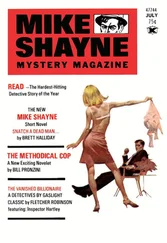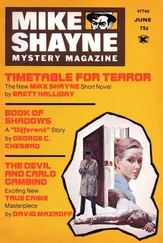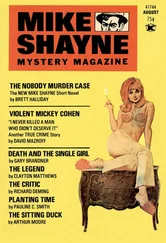Robert Bloch - Michael Shayne Mystery Magazine. Vol. 1, No. 1. September 1956
Здесь есть возможность читать онлайн «Robert Bloch - Michael Shayne Mystery Magazine. Vol. 1, No. 1. September 1956» весь текст электронной книги совершенно бесплатно (целиком полную версию без сокращений). В некоторых случаях можно слушать аудио, скачать через торрент в формате fb2 и присутствует краткое содержание. Город: New York, Год выпуска: 1956, Издательство: Renown Publications, Жанр: Детектив, на английском языке. Описание произведения, (предисловие) а так же отзывы посетителей доступны на портале библиотеки ЛибКат.
- Название:Michael Shayne Mystery Magazine. Vol. 1, No. 1. September 1956
- Автор:
- Издательство:Renown Publications
- Жанр:
- Год:1956
- Город:New York
- ISBN:нет данных
- Рейтинг книги:3 / 5. Голосов: 1
-
Избранное:Добавить в избранное
- Отзывы:
-
Ваша оценка:
- 60
- 1
- 2
- 3
- 4
- 5
Michael Shayne Mystery Magazine. Vol. 1, No. 1. September 1956: краткое содержание, описание и аннотация
Предлагаем к чтению аннотацию, описание, краткое содержание или предисловие (зависит от того, что написал сам автор книги «Michael Shayne Mystery Magazine. Vol. 1, No. 1. September 1956»). Если вы не нашли необходимую информацию о книге — напишите в комментариях, мы постараемся отыскать её.
Michael Shayne Mystery Magazine. Vol. 1, No. 1. September 1956 — читать онлайн бесплатно полную книгу (весь текст) целиком
Ниже представлен текст книги, разбитый по страницам. Система сохранения места последней прочитанной страницы, позволяет с удобством читать онлайн бесплатно книгу «Michael Shayne Mystery Magazine. Vol. 1, No. 1. September 1956», без необходимости каждый раз заново искать на чём Вы остановились. Поставьте закладку, и сможете в любой момент перейти на страницу, на которой закончили чтение.
Интервал:
Закладка:
“No one, the last I heard. They didn’t have any kids, and the real estate man couldn’t sell it. Pete Taylor’s place is vacant, too. Same reason.”
“It adds up — adds up to fifty-six thousand dollars, if I’m right. When could we go?”
“Tomorrow, if you like. It’s my day off. We can use my car. Oh, darling, I’m so excited!”
She didn’t have to tell him. He could feel it, feel her as she came into his arms. Once more, he had to force himself, had to keep thinking about something else, so that he wouldn’t betray how he felt.
He had to keep thinking about the money, and about what he’d do after they found it. He needed the right answer, fast.
He was still thinking when she lay back, and then she suddenly surprised him by asking, “What are you thinking about, darling?”
He opened his mouth and the truth popped out. “The money,” he said. “All that money. Twenty-eight gees apiece.”
“Does it have to be apiece, darling?”
He hesitated — and then the right answer came. “Of course not — not unless you want it that way.” And it wouldn’t be. It was still fifty-six thousand, and it would be his after they found it.
All he had to do was rub her out.
III
If Rusty had any doubts about going through with it, they vanished the next day. He spent the morning and afternoon with her in her room, because he had to. There was no sense in letting them be seen together here in town or anywhere around the lake area.
So he forced himself to stall her, and there was only one way to do that. By the time twilight came, he would have killed her anyway, money or no money, just to be rid of her stinking fat body.
How could Mike have ever figured she was good-looking? He’d never know, any more than he’d ever known what had gone on in the little jerk’s head when he suddenly decided to knock off his best friend and steal the dough.
But that wasn’t important now — the important thing was to find that black metal box.
Around four o’clock he slipped downstairs and walked around the block. In ten minutes, she picked him up at the corner in her car.
It was a good hour’s drive to the lake. She took a detour around Norton’s Center, and they approached the lake shore by a gravel road. He wanted her to cut the lights, but she said there was no need, because nobody was there anyway. As they scanned the shore Rusty could see she was telling the truth — the lake was dark, deserted, in the early November night.
They parked behind Pete Taylor’s shack. At sight of it, Rusty realized that the body couldn’t possibly be hidden there. The little rickety structure wouldn’t have concealed a dead fly for long.
Helen got a flashlight from the car.
“I suppose you want to go straight to the boathouse,” she said. “It’s down this way, to the left. Be careful — the path is slippery.”
It was treacherous going in the darkness. Rusty followed her, wondering if now was the time. He could pick up a rock and bash her head in while she had her back to him.
No, he decided, better wail. First see if the dough was there, see if he could find a good place to leave her body. There must be a good place — Mike had found one.
The boathouse stood behind a little pier running out into the lake. Rusty tugged at the door. It was padlocked.
“Stand back,” he said. He picked up a stone from the bank. The lock was flimsy, rusty with disuse. It broke easily and fell to the ground.
He took the flashlight from her, opened the door and peered in. The beam swept the interior, piercing the darkness. But it wasn’t total darkness. Rusty saw the glow of a hundred little red cigarette butts winking up at him, like eyes.
Then, he realized, they were eyes.
“Rats,” he said. “Come on, don’t be afraid. Looks like our hunch was right.”
Helen moved behind him, and she wasn’t afraid. But he had really been talking to himself. He didn’t like rats. He was glad when the rodents scattered and disappeared before the flashlight’s beam. The sound of footsteps sent them scampering off into the corners, into their burrows beneath the boathouse floor.
The floor! Rusty sent the beam downward. It was concrete, of course. And underneath...?
“Damn it!” he said. “They must have been here.”
They had — because the once-solid concrete floor was rubble. The pick-axes of the sheriff’s men had done a thorough job.
“I told you,” Helen Krauss sighed. “They looked everywhere.”
Rusty swept the room with light. There was no boat, nothing stored in corners. The beam bounced off bare walls.
He raised it to the flat roof of the ceiling and caught only the reflection of mica from tar-paper insulation.
“It’s no use,” Helen told him. “It couldn’t be this easy.”
“There’s still the house,” Rusty said. “Come on.”
He turned and walked out of the place, glad to get away from the rank, fetid animal odor. He turned the flashlight toward the roof.
Then he stopped. “Notice anything?” he said.
“What?”
“The roof. It’s higher than the ceiling.”
“So what?”
“There could be space up there,” Rusty said.
“Yes, but...”
“Listen.”
She was silent — both of them were silent. In the silence, they could hear the emerging sound. It sounded at first like the patter of rain on the roof, but it wasn’t raining, and it wasn’t coming from the roof. It was coming from directly underneath — the sound of tiny, scurrying feet between roof and ceiling. The rats were there. The rats and what else?
“Come on,” he muttered.
“Where are you going?”
“Up to the house — to find a ladder.”
He didn’t have to break in, and that was fine. There was a ladder in the shed, and he carried it back. Helen discovered a crowbar. She held the flashlight while he propped the ladder against the wall and climbed up. The crowbar pried off the tarpaper in strips. It came away easily, ripping out from the few nails. Apparently, the stuff had been applied in a hurry. A man with only a few hours to work in has to do a fast job.
Underneath the tarpaper, Rusty found timbers. Now the crowbar really came in handy. The boards groaned in anguish, and there were other squeaking sounds as the rats fled down into the cracks along the side-walls. Rusty was glad they fled, otherwise he’d never have had the guts to crawl up there through the opening in the boards and look around. Helen handed him the flashlight, and he used it.
He didn’t have to look very far.
The black metal box was sitting there right in front of him. Beyond it lay the thing.
Rusty knew it was Pete Taylor, because it had to be, but there was no way of identification. There wasn’t a shred of clothing left, nor a shred of flesh, either. The rats had picked him clean, picked him down to the bones. All that was left was a skeleton — a skeleton and a black metal box.
Rusty clawed the box closer, opened it. He saw the bills, bulging in stacks. He smelled the money, smelled it even above the sickening fetor. It smelled good, it smelled of perfume and tenderloin steak and the leathery seat-cover aroma of a shiny new car.
“Find anything?” Helen called. Her voice was trembling.
“Yes,” he answered, and his voice was trembling just a little too. “I’ve got it. Hold the ladder, I’m coming down now.”
He was coming down now, and that meant it was time — time to act. He handed her the crowbar and the flashlight, but kept his fingers on the side of the black metal box. He wanted to carry that himself. Then, when he put it down on the floor, and she bent over to look at it, he could pick up a piece of concrete rubble and let her have it.
Читать дальшеИнтервал:
Закладка:
Похожие книги на «Michael Shayne Mystery Magazine. Vol. 1, No. 1. September 1956»
Представляем Вашему вниманию похожие книги на «Michael Shayne Mystery Magazine. Vol. 1, No. 1. September 1956» списком для выбора. Мы отобрали схожую по названию и смыслу литературу в надежде предоставить читателям больше вариантов отыскать новые, интересные, ещё непрочитанные произведения.
Обсуждение, отзывы о книге «Michael Shayne Mystery Magazine. Vol. 1, No. 1. September 1956» и просто собственные мнения читателей. Оставьте ваши комментарии, напишите, что Вы думаете о произведении, его смысле или главных героях. Укажите что конкретно понравилось, а что нет, и почему Вы так считаете.
